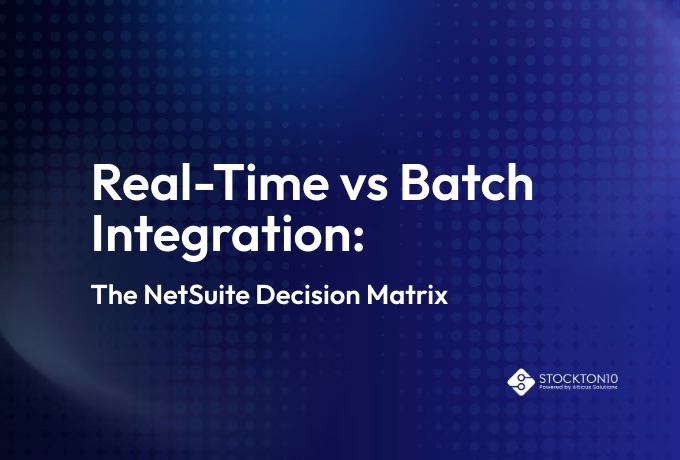Every ERP starts clean.
Then the real world sets in.
Custom scripts multiply. Someone hardcodes a field ID. A developer leaves without documenting their logic. The next deployment breaks something no one remembers building.
That’s when you realize: NetSuite development isn’t just coding—it’s change management, version control, and discipline disguised as JavaScript.
And when your provider doesn’t treat it that way, things start to unravel.
What NetSuite Development Really Means for Your Business
NetSuite development is the craft of extending NetSuite’s built-in functionality so it actually fits how your company operates.
It’s about solving day-to-day friction like automating approvals, integrating systems, or building tools that fill NetSuite’s gaps.
When done right, it lets you:
- Automate manual work like journal posting, allocations, and multi-subsidiary approvals.
- Integrate Shopify, HubSpot, or in-house CRMs without breaking every time a field name changes.
- Design role-based dashboards so managers see performance instantly instead of exporting CSVs.
- Improve user experience with clean forms and relevant buttons instead of endless clutter.
But when done poorly, you end up with what one administrator called “eight years of unsupervised code that spiraled into over-customization hell.”
That’s the gap Stockton10 exists to close: rebuilding stability after the scripts stop playing nice.
Why Companies Outsource NetSuite Development
Most internal teams don’t have the bandwidth (or the specialized knowledge) to maintain NetSuite environments full-time.
So they hire agencies or freelancers.
That can work… but only if the partner treats your ERP like production infrastructure, not a playground.
Too often, we see clients inherit chaos from “gig-style” projects.
Scripts are copied from previous clients, deployments happen manually from VS Code, and there’s zero process for rollback.
One IT manager recently shared:
“We store our code in GitHub, push scripts manually, and sometimes changes just get overridden. There’s no reliable deployment path.”
That’s not uncommon.
Even developers in large companies admit they still copy-paste updates through the browser because no one set up proper CI/CD pipelines.
Which brings us to the core issue: when your NetSuite development provider doesn’t enforce engineering discipline, you end up buying technical debt instead of progress.
4 Red Flags in NetSuite Development Providers You Should Never Ignore
Every unstable NetSuite build starts the same way—small shortcuts that slip through review.
Hard-coded fields.
Missed version control.
Scripts written with no rollback plan.
They don’t break everything at once; they just make your system harder to trust. These are the warning signs your NetSuite development partner is putting speed over stability.
1. Generic code instead of tailored NetSuite solutions
If your environment feels like a “demo template with your logo on top,” this is why.
Many low-cost developers reuse the same scripts across clients. The logic looks fine in testing but collapses when real data hits.
How it shows up
- Script IDs overlap because someone reused them from another client’s project.
- Field references are hardcoded, so a single name change breaks half your workflows.
- No version control. Developers are uploading files directly to the File Cabinet.
We’ve opened environments where three developers were editing the same script manually. Every fix erased someone else’s work.
One NetSuite lead put it bluntly:
“Regular deployment collisions are as much a planning problem as they are a code problem.”
What it costs you:
- A single missed dependency can freeze order fulfillment for days.
- Upgrading to a new NetSuite release becomes a gamble.
- No one—not even the developer—can explain why a script runs the way it does.
What a good developer does:
- Uses SuiteCloud Development Framework (SDF) or CI pipelines for controlled deployments.
- Documents logic and parameters inside every script.
- Breaks code into modular components instead of one thousand-line Suitelets.
If your provider can’t hand over documentation or explain their deployment plan, they’re building something you won’t be able to maintain.
2. Slow turnaround and broken communication
“Unexpected complexity.”
That’s the phrase clients hear when their project is weeks late.
In reality, slow turnaround often hides poor coordination. One developer handles both coding and deployment. Testing happens in production. And every issue is relayed through email instead of a shared project tracker.
One internal NetSuite manager described it like this:
“The business makes immediate demands, so developers drop one task for another. Half-finished work overlaps and gets overwritten.”
That’s not agility; that’s drift.
Common symptoms:
- Developers ask for the same context repeatedly.
- You never see release notes or code diffs.
- Fixes create new bugs elsewhere.
Without structure, every change feels like trial and error.
A reliable provider sets up a rhythm: daily updates, sprint boards, code reviews, and peer validation before anything goes live.
At Stockton10, we use dedicated consultants per client. The same person who wrote your code stays through testing, deployment, and post-go-live monitoring.
That continuity matters. It means every decision has context, and you never hear “Let me check who built that.”
3. “We’ll figure it out later” during scoping or testing
If your developer starts writing code before confirming how NetSuite handles a transaction type, stop the project.
That’s how data corruption begins.
We’ve seen well-meaning freelancers deploy scripts directly to production because they “didn’t have sandbox access.”
Others promise integrations before even checking if your plan includes RESTlet or SuiteTalk API rights.
One partner said it best:
“I see teams push updates without validating SuiteScript governance limits, then wonder why Map/Reduce scripts time out.”
Warning signs:
- No technical documentation before build.
- No QA checklist or sandbox testing.
- Every deployment requires manual rollback.
The fallout:
- Custom records duplicate data because concurrency wasn’t planned.
- Scripted approvals trigger twice because conditions overlap.
- Scheduled scripts hit NetSuite’s 10,000-unit governance limit and fail silently.
Testing isn’t optional. The best developers simulate concurrency, use Jest for unit testing, and validate governance usage before go-live.
As one engineer summarized online:
“The biggest fail in NetSuite development is not being prepared for error handling.”
At Stockton10, no code reaches production without version control, peer review, and sandbox validation.
Period.
4. No post-deployment accountability
You can tell a lot about a provider by what happens three weeks after launch.
When the first bug surfaces, do they respond—or do they invoice you?
Clients often come to us saying:
“Our original consultant vanished. Now we’re paying hourly just to fix what was already delivered.”
That’s the cost of unclear SLAs and “project-based” contracts with no long-term ownership.
What neglect looks like:
- Support hours that expire after 30 days.
- No logs or rollback options when scripts fail.
- Updates break every quarter during NetSuite’s release cycle.
What real accountability looks like:
- Continuous monitoring and version backups.
- Proactive alerts when governance units spike or errors repeat.
- Guaranteed response time—ours is 30 minutes.
Every Stockton10 client has non-expiring support hours, meaning you can come back months later without starting from zero.
The same developers who built your scripts stay available for fixes, optimizations, and future releases.
Because true NetSuite development isn’t about one-off builds—it’s about stewardship.
How Stockton10 Approaches NetSuite Development Differently
When we take over a broken environment, it’s rarely because of bad intentions.
It’s usually because no one implemented structure.
Here’s how we prevent that from happening again:
- Version-controlled builds using SDF, Git, and CI pipelines. No manual uploads.
- Sandbox-first testing with performance monitoring before release.
- Dedicated consultants who stay through every phase. No handoffs, no “new team” next quarter.
- Transparent project tracking so you always know what’s deployed and what’s pending.
- 30-minute guaranteed response time for all active clients.
- No expiring support hours. Your investment stays valid.
We focus on reliability, not flash. Clean code, stable environments, and documentation that future developers can actually read.
Because when your ERP runs quietly, that’s when it’s working right.
Key Benefits of Working with a Certified NetSuite Development Partner
Partnering with certified developers isn’t just about skill—it’s about preventing repeat pain.
Here’s what to expect when development is done right:
- Predictable performance: Scripts are modular, optimized, and designed around NetSuite’s governance rules.
- Easier maintenance: Every script has comments, IDs, and dependency notes for seamless updates.
- Integration fluency: RESTlets, SuiteTalk, and third-party APIs are implemented with authentication, retry logic, and logging built in.
- Scalable automation: Map/Reduce scripts handle high data volumes without hitting concurrency limits.
- Business-aware builds: Developers understand accounting, inventory, and order management—not just syntax.
One developer community member noted:
“If you can combine technical skills with accounting knowledge for the industry you work in, you’ll always be in demand.”
That’s why Stockton10 pairs developers with consultants who actually understand finance and operations.
The result: code that supports how you work, not just how NetSuite is structured.
Frequently Asked Questions
1. What’s the difference between NetSuite customization and NetSuite development?
Customization uses built-in tools like workflows and saved searches. Development goes deeper, using SuiteScript, RESTlets, and APIs to create new logic, integrations, or automation.
2. How can I tell if my NetSuite developer is using best practices?
Ask for version control logs, documentation, and sandbox test results. If your developer says, “We just test in production,” that’s a deal-breaker.
3. My system feels slow. Could bad development be the cause?
Yes. Scripts that loop through records inefficiently or run searches per line item can cause performance degradation. Optimized code consolidates queries and runs asynchronously where possible.
4. Do I need SDF to manage deployments?
If your team handles multiple environments or developers, absolutely. SDF (SuiteCloud Development Framework) ensures deployments are consistent and reversible without any manual uploads or missing files.
5. Does Stockton10 work with integrations outside NetSuite?
Yes. We build and maintain integrations for eCommerce, CRM, finance, and manufacturing systems through APIs and middleware.
Final Thoughts
When your ERP breaks, it’s rarely because NetSuite failed.
It’s because the people who built on top of it didn’t treat it like the mission-critical system it is.
Bad NetSuite development looks quiet at first—until users start complaining that scripts “sometimes just stop working.”
Good development feels invisible. It just works.
At Stockton10, we’ve seen what happens when companies are left with half-finished projects, unclear documentation, and vanishing support.
Our mission is simple: rebuild confidence.
No expiring hours. No untracked code. No surprises.
If your NetSuite environment feels unstable, we can help you stabilize, clean up, and extend it safely.
Partner with Stockton10.
Enhance your NetSuite system with development that lasts.
Contact us for custom NetSuite development.














